Mike's 2022 Games of the Year
Published on Mar 11, 2023
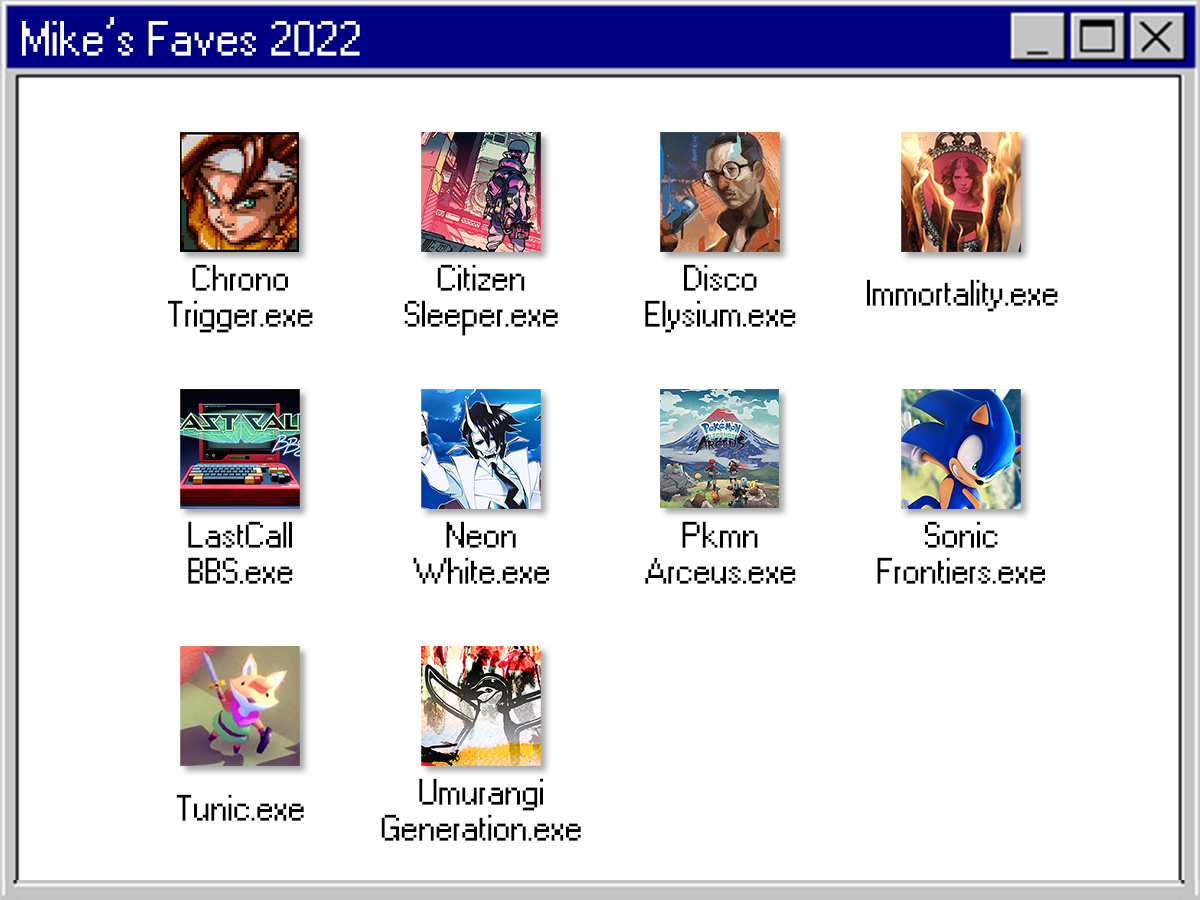
Hey there, sports fans! I’m back once again to dig through another year of video games and see what gave me the most jollies!
I played a grand total of 105 video games in 2022, my highest total ever. There were a lot of super short one-offs in there to pad things out, but I also just allowed myself to go out on more limbs and try more things. I highly recommend it!
My full list of everything I played in 2022 will be out shortly after this post is done.
Without further ado, I give you…
MIKE’S FAVORITE GAMES OF 2022
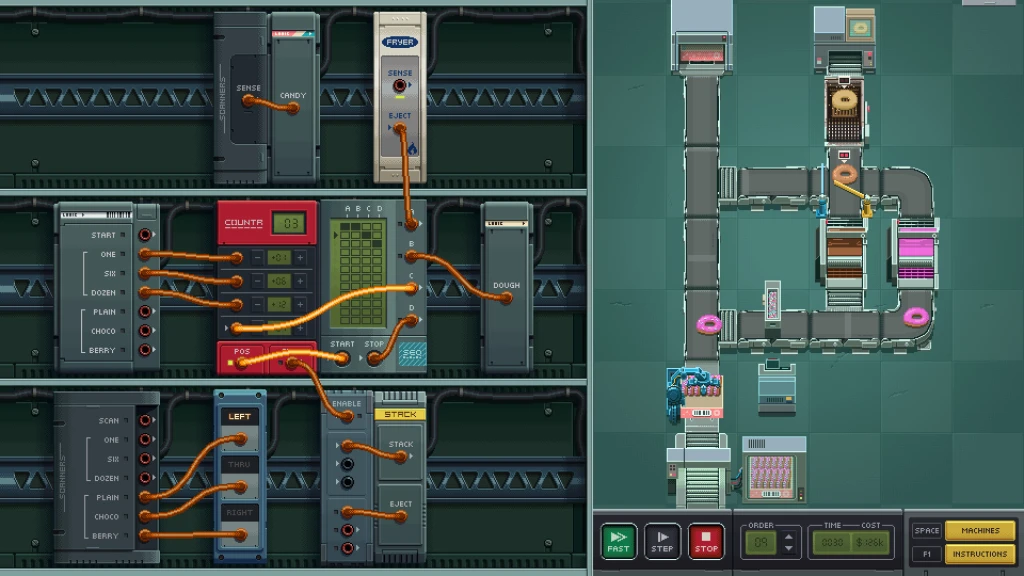
Last Call BBS
I’m not a longtime fan of Zachtronics games, but the marketing for this one really grabbed me for some reason. Maybe I felt a responsibility to witness some kind of history, as Last Call BBS was announced as the studio’s final game. Or maybe it just looked cool!
Whatever the case, I ended up really digging Last Call‘s whole deal. I thought the way it used its presentation to hearken back to the (good/bad) old days of dial-up internet and slower technology was brilliant. And releasing the game as a collection of smaller puzzle games made it easy to bop around and find something I really gelled with. I liked all of them at least a little bit, but 20th Century Food Court, ChipWizard™ Professional, and Sawayama Solitaire were standouts for me.
Something about using their last game as an occasion to look back compelled me, too. To create a bygone world populated by their games, cast in amber. And it’s always nice to play another game that emulates the whirs and clicks and hums of old computer hardware.
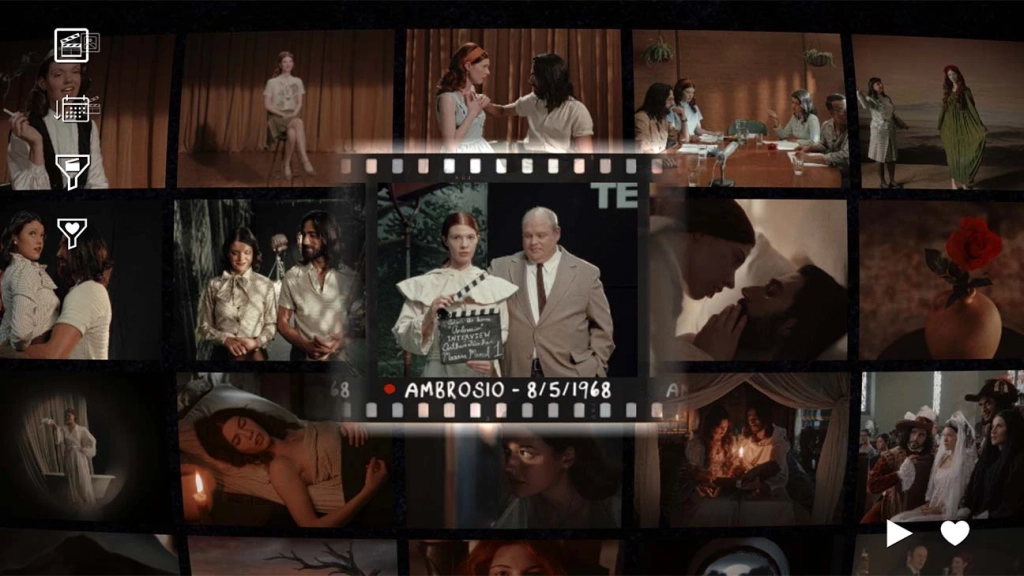
Immortality
Immortality arrived on the scene to much fanfare as Sam Barlow and Half Mermaid Productions continue their slow, masterful rehabilitation of the FMV game. It’s also the first game of theirs I played at launch! I started playing with my girlfriend and my friend Zac one rainy night in Brooklyn when it had just started to thunder. It was pretty much the perfect way to start, and like Her Story before it, I was compelled from the jump to keep pushing forward and try to make sense of everything I was seeing. As someone who works in video post production, I also really connected to the game’s UI, or lack thereof. Playing on keyboard, scrubbing forward (and backward 😉) through film clips, I literally just felt like I was doing my job (in a good way).
Ultimately, the game ended up feeling a bit anticlimactic for me, and I reached a place where I wasn’t really sure if it had… ended? Like I’m pretty sure I learned what happened to everyone, but not why it matters. I’m still there. I haven’t found each and every last film clip, because that frankly seems sort of tedious, as a simple and intuitive way to do so has not presented itself, and I’m not even sure if going through that process would make a difference.
I really wanted to be blown away by Immortality, and in just about every way but the narrative, I was! Half Mermaid produced three entire films plus supplemental material for this game. That must’ve been a logistical nightmare! Not to mention the multi-layered performances required of the actors. And the experience of discovering and scrubbing through each new clip and eventually uncovering a hidden meta-narrative was one of my favorite overall interactions with a game this year. Immortality turned out to be more about the journey than the destination for me, but I do genuinely think more people should play it. It’s a pretty exquisite journey. And it’s basically everywhere. It’s on Netflix, for cryin’ out loud!
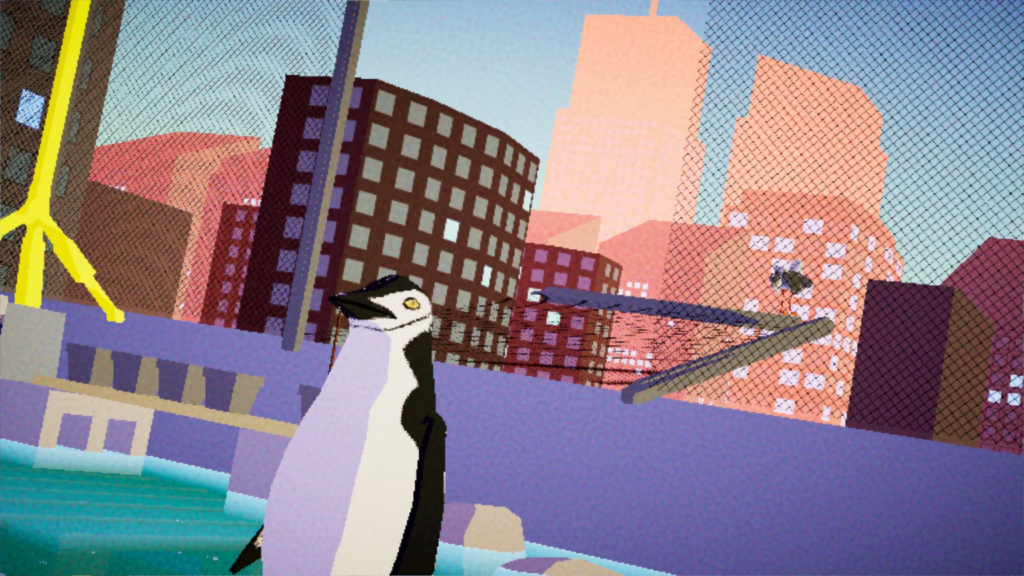
Umurangi Generation
As the very first game I played in 2022, and recency bias being what it is, Umurangi Generation was in real danger of being forgotten once GOTY time rolled around. But it really stuck with me! The tactility of snapping through the different lenses and settings of your camera to compose a shot was terribly satisfying. The chunky graphics, funky tunes, and interesting color palettes made each level feel unique, and the laundry list of things to discover, paired with a growing collection of camera hardware, kept me coming back until I’d seen it all.
Umurangi Generation also has a story to tell, which it does largely in the periphery, through level design, and the things going on around your character as you continue to take photos to tick off your checklist. By keeping the thing you’re doing the same (taking photos), but changing the material conditions under which you are doing them, the game also creates a really elegant meta-narrative about The Way Things Are, which has only continued to resonate more strongly in the years since its release.
But Umurangi is also really special to me because it is partly responsible for pushing me to finally try out a hobby I’ve been curious about for a long time: film photography. The fact that it made the act of taking photos feel so fun (and involved and fiddly) played no small part in my buying an old camera off eBay, and finally taking some shots of my own. If nothing else, I’ll always remember it for that.
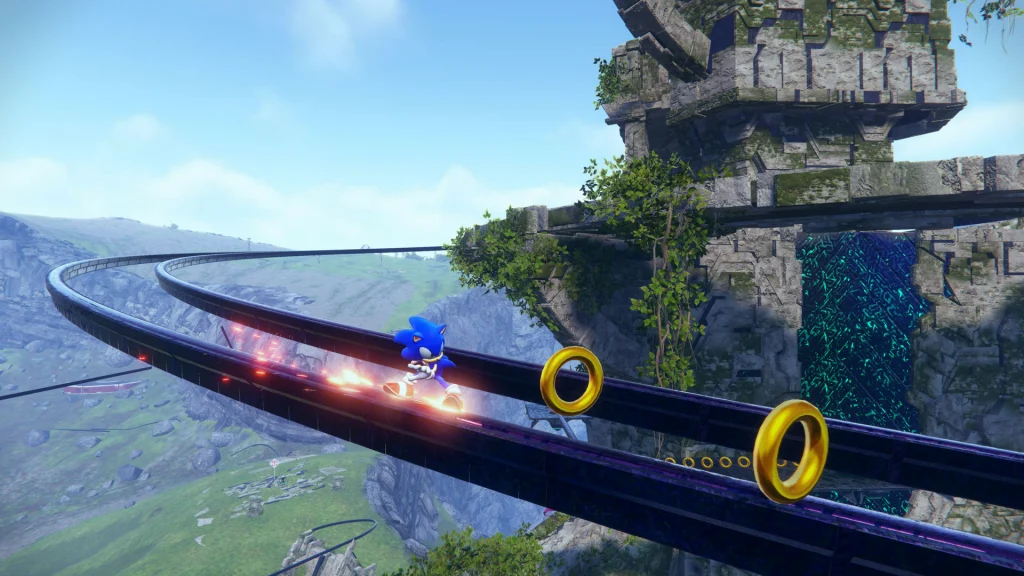
Sonic Frontiers
Every new Sonic game is a coin flip, let’s be honest. Especially 3D Sonic games. It feels like the best outcome we in the Sonic community have gotten for years has been a coin that landed standing up on its edge. Over. And over. And a lot of tails. Not as in Miles Prower, but like… you get it.
Sonic Frontiers is the best 3D Sonic game in at least a decade. Maybe 2 if you’re not as generous. It’s not perfect. It still carries some of the cruft and jank we’ve come to expect from a new Sonic game. But it carries very little of it that I’ve seen so far. To continue the coin metaphor, this one is mostly facing up, but maybe leaning slightly against a wall.
I was wary of Sonic’s move to a Breath of the Wild-style open world, but it really works. It’s really satisfying to zip around the game’s islands as the Blue Blur. Sonic’s usual platforming acrobatics are satisfying and easy to pull off 90% of the time, and the game’s quick-hit Cyberspace levels, with their tight, authored, time-attack experiences, provide the perfect break from all the wide open spaces.
All that, and the fact that the very first island’s final boss battle is easily, for me, the best boss fight in any Sonic game, have me incredibly excited to finish this game, and even more excited for what comes next as Sonic Team build on and improve this new formula.
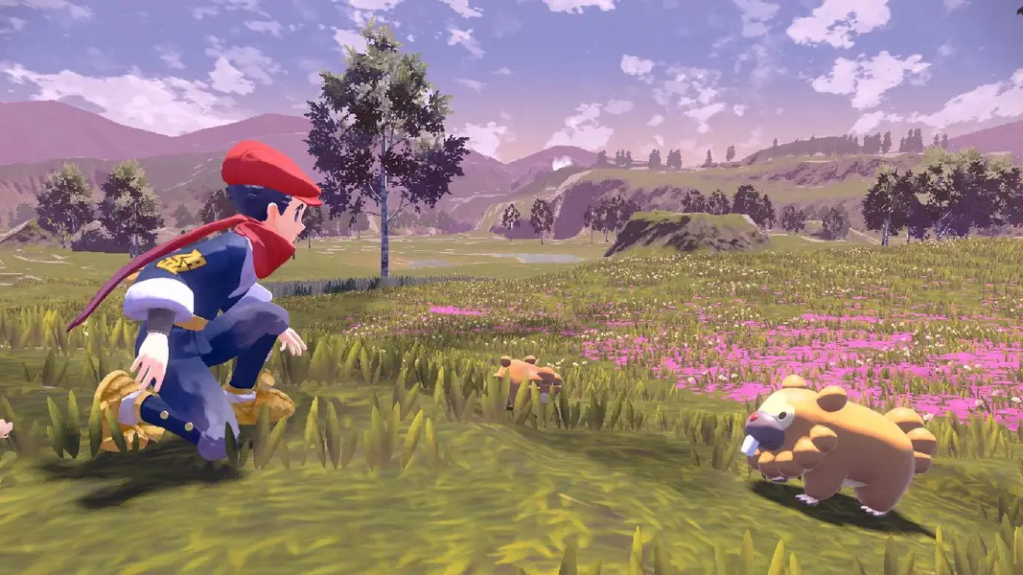
Pokémon Legends: Arceus
It’s so hard to believe this game actually came out in 2022. I double checked so many times. It feels like ages ago. But yes indeed: Game Freak released TWO entire Pokémon games this year, seemingly without ever asking if that would be a good idea. The functional state of these games would suggest “maybe no?” But then, the fact that both games appear to have “made bank,” as it were, suggests otherwise! So what do I know?
Arceus was a real roller coaster for me. I was really hot on it when it was first released, and for a good while after. But the game’s final chapter, with its pointless twists and, if you’ll pardon the expression, wet fart of a story, really soured my memory of the whole experience by the time I was done. I didn’t even bother to stick with it to seek out the “true ending.” I was extremely unprepared, then, for just how nostalgic I would get while watching a speedrun of Arceus at the end of AGDQ 2023 (this post has taken so long oh god). I decided to dip back in the following morning, and I can confirm that this game rules, actually. Especially in contrast to Pokémon Scarlet/Violet, which was released a mere 11 months later.
I’ve spilled a lot of ink on my other blog about the various things I liked about Pokémon Legends: Arceus, so I won’t go into too much more detail here. Suffice to say that, looking back, I think Game Freak was really onto something with most of what they tried in this game, and I really hope they get to carry it through to another installment. The focus on catching rather than battling, a complete overhaul to the way your Pokémon gain experience, the mostly hands-off open world approach, the pared down inventory, right down to the outstanding UI design. All of it made for a fun, chill, and truly interesting take on a franchise that has largely remained unchanged for decades.
It has some rough edges, and it ends up pulling some of its more interesting punches, but for me, it’s the better Pokémon game of 2022. Scarlet/Violet is just missing a lot of the little touches that made Arceus enjoyable to interact with. Understandably so, considering their relative closeness in development. I’m sure those teams weren’t talking to each other, and definitely didn’t have time to share notes. I really hope everyone working on those games gets a good long rest, first of all, and then comes back and combines everything that was great on both sides into something really special, and hopefully, uh… finished.
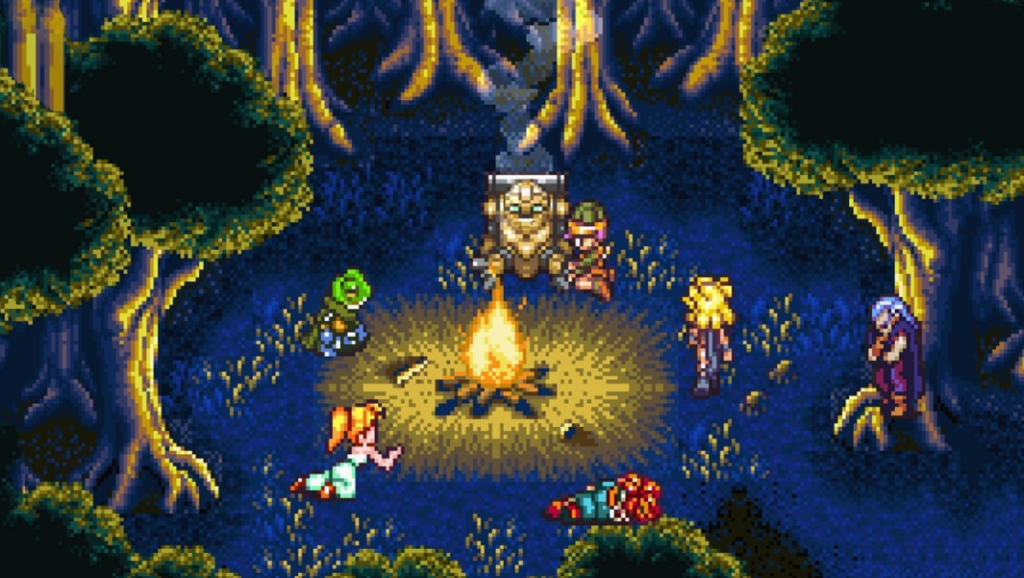
Chrono Trigger
Oh man. Where to even begin with Chrono Trigger? It’s one of those games whose name has loomed large in the back of my head as a thing I should really play one day, much like Final Fantasy VII. One of the big ones. A continuation of the informal “Mike Plays the Classics” trend of the last few years that has seen me play through heavy-hitters like EarthBound, Ocarina of Time, and of course, FF7. Despite this, however, I knew very little about Chrono Trigger before playing. I think I knew about the time travel. And that one of your friends is a frog. But beyond that, nothing terribly specific.
Having played it, I think that might be because Chrono Trigger is one of those stories that you need to experience to understand. It deals in what looks like some pretty generic fantasy & sci-fi fare on its face – a young boy gets pulled into an adventure he isn’t prepared for, and ends up traveling across time in order to save the kingdom and the very world itself – but what becomes clear as you actually play Chrono Trigger, is just how much care went into the game’s creation, such that it is always pulling you deeper into its narrative. I loved, for example, the way that the game’s time-hopping adventure – beyond being just a cool gimmick – allowed you to see your impact on the world across eras, or see a through-line between generations that no one with a normal lifespan or without access to time travel would get to see.
One of my favorite features that stood in stark contrast to other classic RPGs I’ve played, and further evidence of the care that went into this game, was its encounter design. Rather than opting for a random encounter system (where you’re walking through the world and suddenly, bang, an enemy appears), Chrono Trigger‘s enemies are visible out in the world, and can be found in the same locations every time you revisit an area. The player needs to physically walk into an enemy (or enter its battle radius) in order to initiate combat. This doesn’t mean battle is entirely avoidable, but it does mean that battle is often a choice, or at least something the player can anticipate and prepare for. The effect of this is twofold.
Firstly, a consistent placement of enemies creates what feels like a more authored experience, which both makes it feel as though battles are always taking place at just the right time in the story, and also makes sure you’re hitting just the right number of encounters to serve the narrative (so you aren’t, for example, getting bogged down by a ton of random encounters on your way to the next story beat and either forgetting what you’re doing or getting bored and quitting). Second, enemies being visible in the world not only allows for a narrative moment where the player and their party can scope things out as they enter an area and prepare, mentally or materially, for the battles to come, but it also creates situations in which an experienced player will know where to walk in order to avoid some number of battles in an area they’ve previously visited. This creates a sense in the player that they’re learning this world and its locations, and gives that knowledge a mechanical application, as well as a material reward. Not having to fight three or four low-level grunts in a row is a great reward, no matter how fun the game’s battle and technique systems are to interact with.
The game, of course, has two other things going for it that most other games do not: character art by the legendary Akira Toriyama (Dragon Ball, Dragon Quest), and an absolutely perfect soundtrack by Yasunori Mitsuda. Previously a sound effects designer for Square, Mitsuda threatened to quit unless he was allowed to make some music as well. Dude was not messing around. Both bring the game’s world and narrative sparkling to life. I frequently found myself lingering on the overworld map for much longer than I intended, just to take in a few more bars of a new area’s music. Every track perfectly embodies and becomes the place and time it endeavors to describe.
And so, my love affair with big, long, narratives and classic RPGs at which I would’ve previously turned up my nose continues. Chrono Trigger easily earns its title as One Of The Classics, and likely a place in my heart as one of my all time favorites.
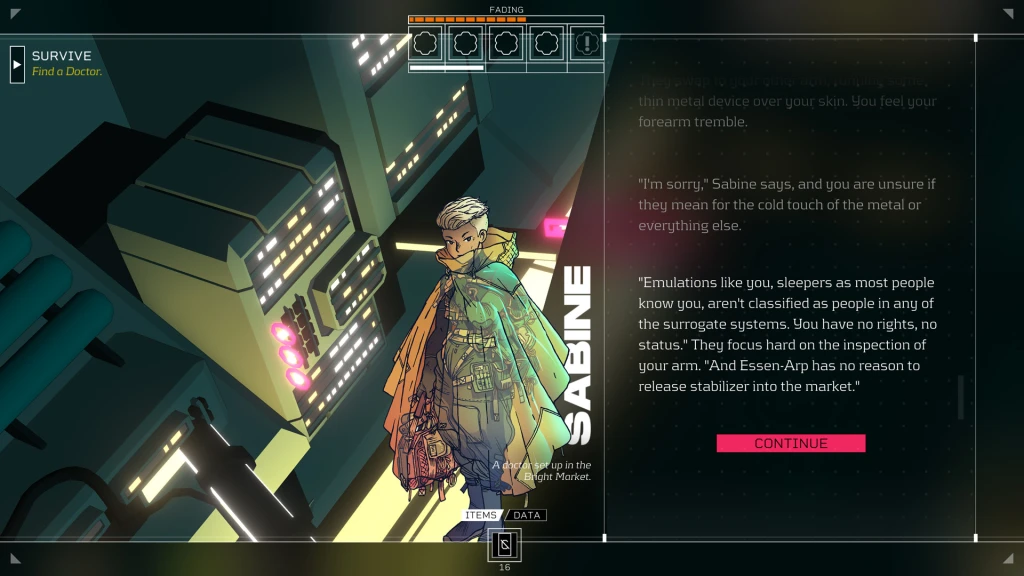
Citizen Sleeper
I took a chance on Citizen Sleeper based pretty much entirely on all the positive coverage it was getting, and the fact that its character illustrations are gorgeous. I’m so glad I did. What I found was a really beautiful, kind, and touching story of community, adopted home, and survival under overwhelming corporate oppression.
Citizen Sleeper is about getting inextricably caught in the webbing of a corporatocracy, and selling yourself, body and soul (literally), for a chance at the privilege of buying yourself back, paying off the debt of having to exist, and slowly, precariously, trying to build a home, a life, and a community, before your body gives up on you or the powers that be come to collect. It’s a game about just trying to Fucking Live. And it might just be the most hopeful game I played in 2022.
I love the way the game portions out your time, by giving you a number of dice – which you’ll spend trying to do things during the day – according to your degree of physical well-being. In Citizen Sleeper (and also in real life), your body, your physical fitness, is both a measurement of how much you can physically attempt to do in a given day, and also a ticking clock. “Fail” to take care of it, and you’ll both be less able to do things and a little closer to doing nothing. Citizen Sleeper implements this in a much more elegant, thoughtful, and thought-provoking way than any survival game with a hunger meter I’ve ever played.
Now, this isn’t a game about developing a grindset that will turn your side hustle into passive income. It’s a game in which the end goal is the equivalent of having just enough for rent each month. It’s about saving up your wages to eat at your favorite food stall, not just because the food is really good, but because the chef tells great stories and you want him to be able to make rent too. It’s about helping your friend set up a kitchen in their shitty little bar, and getting a free meal out of it. It’s about trying to afford or otherwise source the mythical drugs that keep your body from shutting down.
All in all, Citizen Sleeper is a game about carving out a little something shaped like happiness in the middle of an endless void. Not complacency, not complicity, just creating what joy you can while the wheel keeps turning. And comfortingly, it’s a game in which that is possible.
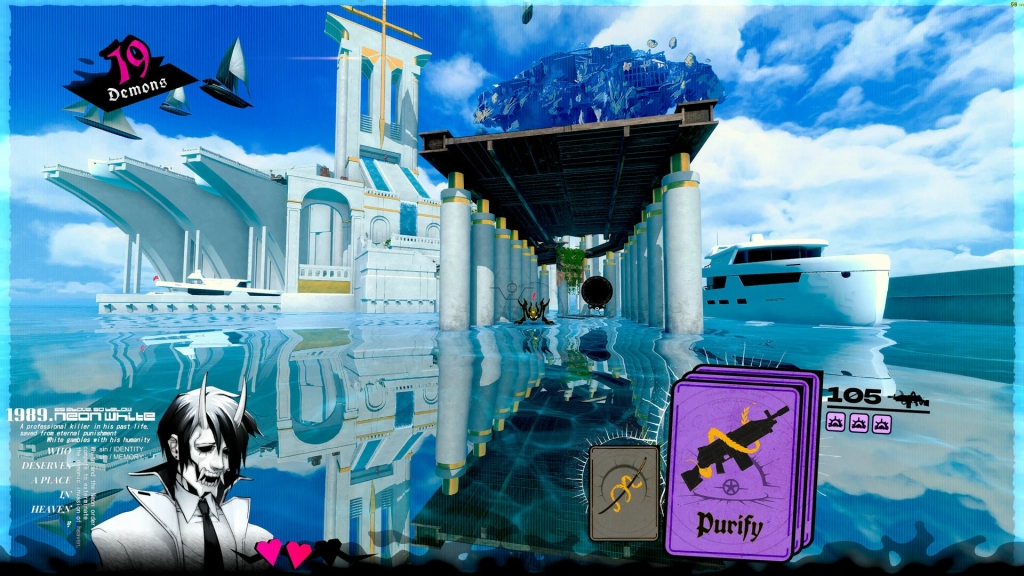
Neon White
Now here’s a game I did not see coming. Announced offhandedly on a Nintendo Direct I was half watching, I initially wrote Neon White off as some anime bullshit. Luckily, my friend Zac was extremely into that anime bullshit, and helped me see the light.
There’s a particular feeling you get from certain video games, when the gameplay is fairly simple but extremely satisfying at its foundation, and the penalty for failure is very low and/or short. I’m thinking of games like Super Meat Boy, where the platforming is perfectly tuned, and failure means instantly restarting the level, rather than having to endure lengthy death animations, game over screens, or being kicked out to an overworld map. Games like this keep you in this perfect flow state, where you can stay concentrated on your goal, and grind out your execution until you get things absolutely perfect. This feeling is extremely addictive for me.
Neon White is what you get when someone distills that feeling down to its purest form, packages it in an early-2000s Sega Dreamcast aesthetic, and pumps it directly into your veins. It’s what you get when you put Super Meat Boy in 3D, give him guns and sick acrobatic abilities, and make him listen to constantly-thumping, heartrate-elevating drum & bass tracks. It’s an order-of-operations brain teaser, crossed with Formula 1, poured inside a first-person shooter. It’s the digital incarnation of the idea of flow state. It is a manic, pulsing, pounding need to be faster. No thoughts, just reflexes. Pure execution. Building up your muscle memory to its zenith, and moving on to the next challenge.
I had an incredibly good time racing my way through Neon White‘s levels, an experience that is improved by an order of magnitude by having a friend or friends who have played or are also playing the game, who will then appear on your personal leaderboards to race against. Nothing lit a fire under my ass like seeing that Zac had shaved a tenth of a second off of my previously leading time. After speeding my way through 100% of the game (though there are still things left to do), I feel like I get a little bit of why speedrunners do what they do.
One final thought that hit me at some point during my playthrough, was that this is what Sonic games should be. It should be about speed and tight execution. It should be about what it feels like to be very fast. Neon White scratched that itch more consistently and thoroughly than any Sonic game ever has for me. Just food for thought. Sega, I await your call.
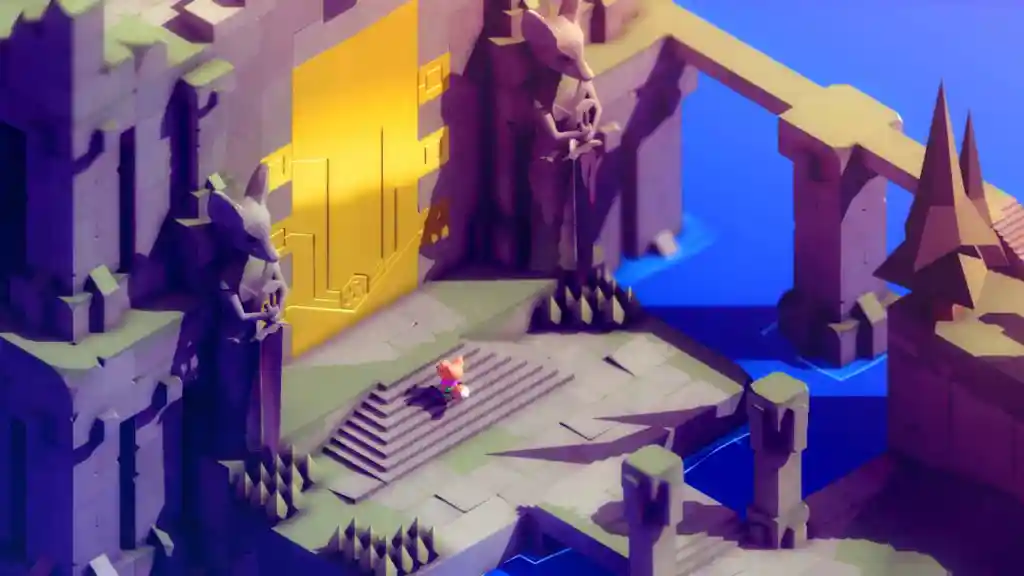
Tunic
This gorgeous game about a little fox has been a long time coming for me. I’d been following Tunic’s development since it was being called “Secret Legend.” So it was a real treat to learn that the game was finally going to be released the day before my birthday. March is probably my favorite time of year. Selfishly so, because of my birthday, but also because it’s usually when we get our first glimpses of spring. Things start to warm up, the world starts to wake up, and you get that certain smell on the breeze. I find it to be an invigorating time of year. It makes me want to play video games.
I was also having a root canal taken care of at this time, which meant lots of recovery time on the couch. Which meant plenty of time for video games.
So Tunic showed up at the perfect time for me to accept it into my heart, but it also delivered just the right vibes. The older I get, the more I’ve found value in collecting video game landscapes that feel nice to be in. Places that make me wish I could leap through the screen and just hang out there for a little while, taking in the sights and sounds. Little digital vacations. The opening area of Tunic (and several other lovely areas as well), with its lush greens, impossibly deep blues, satisfyingly polygonal shrubbery, and the intoxicating tunes of Lifeformed & Janice Kwan, has easily made that list. It’s the audio-visual equivalent of sitting in a warm sunbeam.
Of course, one cannot talk about Tunic without talking about secrets. This game is, at its heart, all about secrets, the history of secrets in video games, and how satisfying it can be to slowly suss out a game’s secrets all on your own, or with some gentle prodding. It’s hard to talk about secrets without giving too much away, so I’ll just say that when I bought Tunic, I didn’t realize that it would be so reverentially obsessed with old video game manuals that it would place an exquisitely crafted exploration of that very concept at its core. That mechanic was such a delight to discover, and I mean that in more ways than one!
Tunic is a puzzlebox waiting for you to find its center. It’s just meaty enough to keep you coming back for more. And it respects you enough to let you figure it all out for yourself.
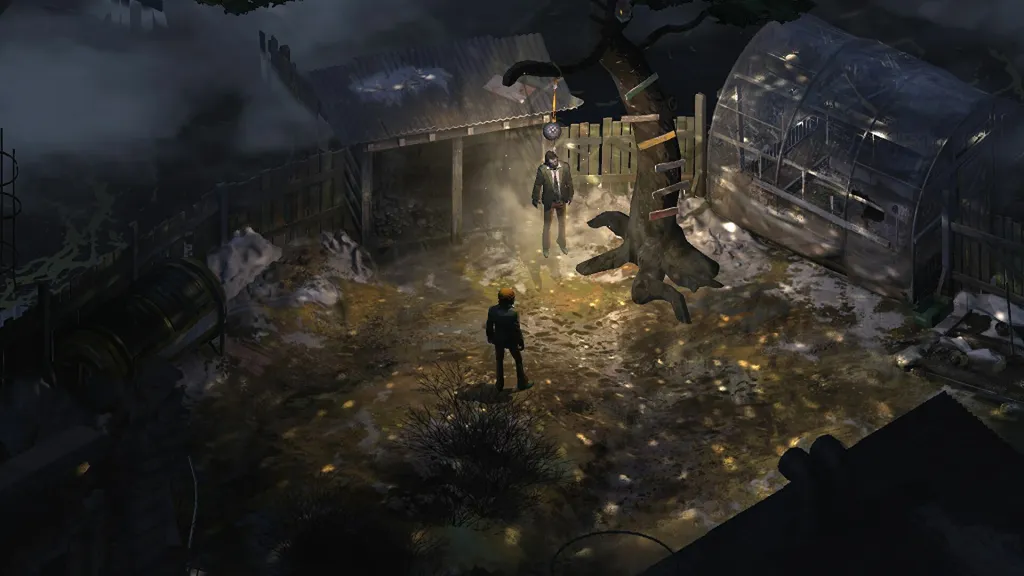
Disco Elysium
This was always going to be the game at the top of my list, from the moment I decided to play it, whether I knew it or not. I suspected it. I bought a very expensive jacket because I could tell within an hour of starting that this game was special. Here we go. This is the big one.
Disco Elysium is ostensibly a game about being a cop and investigating a murder. It is also, more broadly, a game about being sad and thinking. That isn’t just my cheeky way of saying it’s about communism, though that is also true. Everything in this game is a conversation, is words, is interacting with thoughts and ideas in some way, whether you’re talking to another character, or to the different facets of your own brain. The in-game clock doesn’t move, time doesn’t pass, you aren’t allowed to do more things, if you aren’t either talking to someone, thinking, or reading. You have to be thinking to move forward. As far as Disco Elysium is concerned, words are actions. Words are thoughts that you’ve had, made manifest. Words are how you think. Words can comfort or cause harm, and one does those things with intent. To this point, the coolest, kindest person in the game, your partner in this investigation, Lt. Kim Kitsuragi, always chooses his words very carefully.
You play as a detective named Harry DuBois, though he doesn’t know that at the start. After a particularly thorough bender, and like many video game protagonists before him, Harry has lost his memory. But unlike many other protagonists, Harry has lost his memory. He hasn’t just forgotten who he is and what he’s doing, he’s forgotten what city he’s in, what country he’s in, what the world is, how the world works, what money is, what year it is, and what any of that means in context. This is, of course, a very convenient way to introduce the player to the world, but it’s also a great way to tell Harry’s story. And eventually to plant the seed of a larger meditation on memory and nostalgia that has haunted me for, at time of publication, three months. But that’s another blog post entirely.
Harry isn’t just another blank slate for the player to insert themselves into, he has a history, whether he remembers it or not, and revealing it piecemeal through the very relatable feeling (whether via blackout drinking or 3am anxiety thoughts) of, “oh fuck, I did that,” proves extremely effective. This is still a video game, and you’re in control of Harry’s words and deeds for the duration, but you’re not playing as yourself. You’re playing as Harry. Everyone’s Harry may be different, but this isn’t the 1:1 player-insert story that video games are so familiar with, and I love that. I want a story, I want constraints! I want to be made to consider other human beings’ lived experience, fictional or not, something that challenges me to think and to empathize with others – a task video games are uniquely suited to accomplish! Disco Elysium ticks that box with style and ease.
Morality in video games is largely very boring, bordering on non-existent, either letting the player take a milquetoast, middle of the road stance on everything – for the sake of not making anyone mad, or not closing off any potential sidequests or other “content” – or taking the BioWare path of, “do objectively good thing to get good points, or do objectively bad thing to get bad points.” Disco Elysium shows that it doesn’t have to be this way. This game knows that two things can be true at the same time, and knows how to depict that. It knows that people are complex, and that the status quo is sticky. It’s not about trying to “win” at morality. Mostly, the game just wants you to think about your impact on the world and the people around you. It, like life, will put you in situations, long after which you will wonder, “was that the right choice?” And like life, you may never know the answer.
Probably my favorite thing about this game is just how good it is at forcing you to roleplay. Disco affords the player an incredible degree of control over how Harry acts, what he says, what values he adheres to, right down to what he wears, but not without reckoning with his past to some degree, and not without comment from the game itself. If you try to play as milquetoast middle-of-the-road man who is just here to see the story and not ruffle any feathers, the game makes fun of you. It tells you you’re a spineless idiot. It begs you to pick a fucking side. This is a game screaming out that you need to have thoughts and opinions about the world around you, that neutrality is a lie, neutrality is complicity, neutrality is brain death, and everything is political. Games are more fun when you roleplay, and this one gives you a ton of room to do just that. So decide what kind of Harry you want to be, and lean in hard.
Disco Elysium is a game about a world in the aftermath of a failed communist revolution. The game is very open-ended, and outcomes change based on player choice, but that doesn’t mean the game doesn’t have a point of view, or anything of its own to say (this is the game whose creators thanked Marx and Engels when accepting their award for Best RPG at the 2019 Game Awards, after all). It’s just that sometimes, it doesn’t have an answer to its own questions, and that’s okay. Disco Elysium doesn’t contain the secret instructions for how to successfully build communism. It knows the state of the world, and it believes something needs to be done. It just doesn’t know exactly what that is. But it wants you to think about it. And it’s content to poke fun along the way – fairly so – at leftists who sit around arguing about who is the most correct about how to be a leftist.
Disco Elysium is easily the most profound game I have ever played. It has made me think more about myself, my world, my politics, my life, than any other. It’s willing to consider the contradictions between the imperative of doing the work necessary to build a better world, and wanting a joyful life for yourself and your loved ones. It has thoughts about the value of making art in a time of political turbulence (“In dark times, should the stars also go out?”). It’s about choosing, or not, to connect with people. Like life, you get more out of the game the more people you talk to, connect with, take an interest in, and help. And in those interactions, it can either lay you low or heal your weary soul.
It’s a game that people keep saying they haven’t stopped thinking about, years after playing. Wouldn’t you know it? It got me too.
Honorable Mentions
Signalis
Outstanding premise, style, and mechanics. Didn’t play enough, and didn’t hit the way it needed to.
Digimon Survive
The pitch on this game is weird, and I am looking forward to getting back to it.
What Remains of Edith Finch
Finally played this on the couch with my girlfriend over two nights, and loved it!
No Man’s Sky on Switch
The fact that this game actually runs on the Switch, and runs well, is a miracle.
TMNT: Shredder’s Revenger
Cowabunga!
Games I Missed and Want to Play
Kirby and the Forgotten Land
Return to Monkey Island
Pentiment
Norco
In Closing
If you read this down to the end, then you’re my favorite person and I love you! Also I have to apologize for how long this took. I normally grind myself into paste over the Christmas holiday trying to get one of these posted before 12am on January 1st. This time around, some circumstances made me decide to not do that. This is the result. I both hate how long it took me, and am happier with the outcome, having taken my time with it. I did not expect it to take 3 months. Oops!
That’s enough now, get outta here!